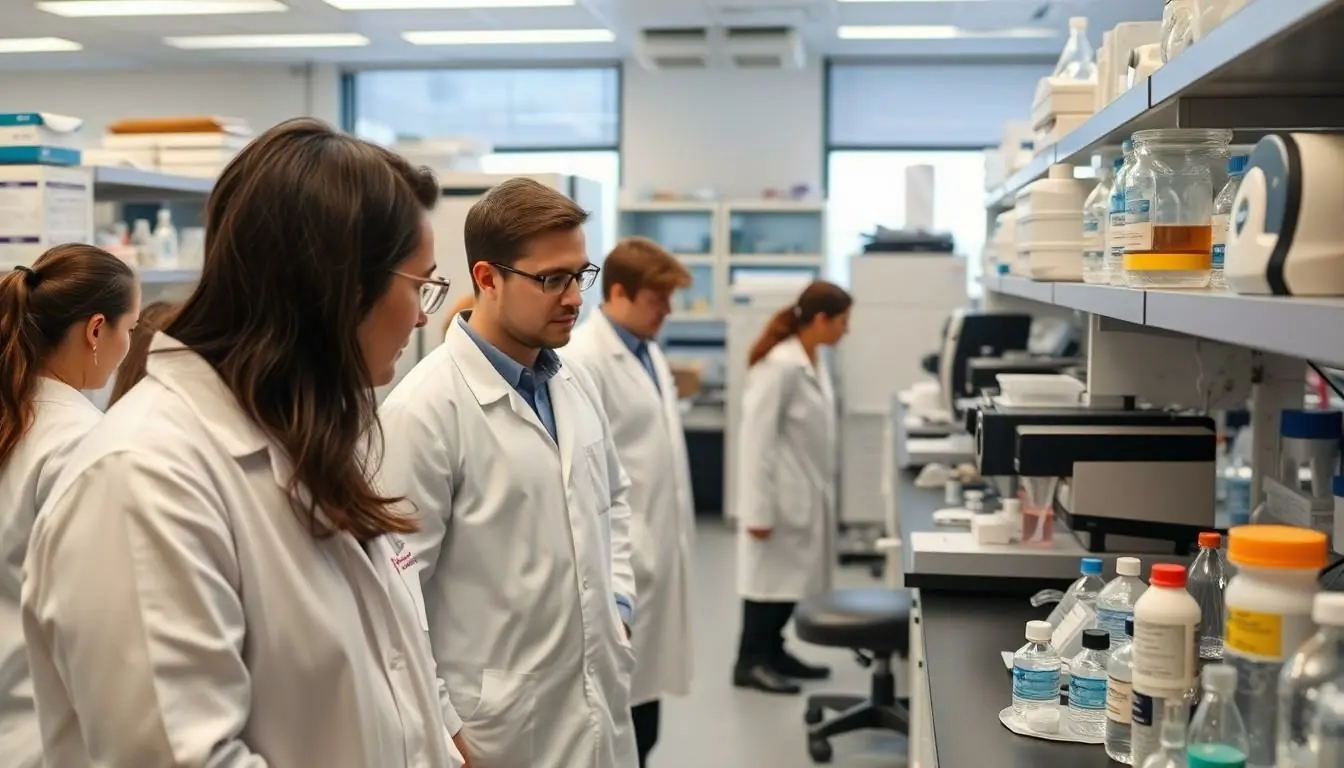Table of Contents
ToggleSeattle isn’t just about coffee and cloudy skies; it’s also the beating heart of biotech innovation. With a thriving ecosystem of biotech companies, the city has become a hotbed for groundbreaking research and development. From life-saving therapies to cutting-edge genetic engineering, these companies are on a mission to change the world—one petri dish at a time.
Overview Of Biotech Companies In Seattle
Seattle’s biotech landscape features diverse companies focusing on groundbreaking research. Key players include established firms, startups, and research institutions collaborating to advance healthcare solutions. Significant investments from venture capital firms fuel this growth, creating an environment ripe for innovation.
Cell and gene therapy companies lead in developing transformative treatments. Their focus targets rare diseases and chronic conditions, showcasing Seattle’s commitment to addressing unmet medical needs. Prominent examples within this category include Juno Therapeutics and Beam Therapeutics, which leverage advanced technologies to enhance patient outcomes.
Diagnostic firms contribute to disease detection and monitoring as well. These companies employ cutting-edge techniques to provide quick and reliable results, allowing for timely interventions. Notable entities like Adaptive Biotechnologies excel in harnessing the power of the immune system for diagnostics.
Clinical research also represents a core component of Seattle’s biotech scene. Companies like Fred Hutchinson Cancer Research Center offer unparalleled expertise in cancer research and treatment refinement. Collaborations with local universities, including the University of Washington, strengthen Seattle’s role in the global research community.
Investments in talent development further support the biotech sector’s expansion. Numerous educational programs and training initiatives attract skilled professionals to the region. These efforts ensure a continuous pipeline of innovative thinkers contributing to the city’s biotech advancements.
Overall, Seattle’s biotech companies exemplify a thriving ecosystem committed to solving some of the world’s most pressing health challenges. With a clear focus on collaboration and innovation, they consistently push boundaries in life sciences and biotechnology.
Key Players In Seattle’s Biotech Scene

Seattle’s biotech scene features numerous influential companies that drive innovation and healthcare advancements.
Major Biotech Firms
Juno Therapeutics leads in cell and gene therapy, focusing on transforming cancer treatment. Adaptive Biotechnologies excels in diagnostics, utilizing cutting-edge technologies for disease detection and monitoring. Also notable, Illumina specializes in genetic sequencing, providing critical tools for research and clinical applications. Other significant players include Amgen and GSK, which actively contribute to drug discovery and development efforts in the region. These established firms harness the region’s collaborative ecosystem, fostering partnerships with local research institutions and universities to accelerate breakthroughs.
Notable Startups
Startups play a vital role in Seattle’s biotech landscape. Lumea focuses on harnessing artificial intelligence to improve health outcomes through better diagnostics. Sana Biotechnology aims to develop transformative cell and gene therapies for a range of diseases. Other startups like StrideBio and Neoleukin Therapeutics are innovating in therapeutic approaches, enhancing treatment options for patients. This diverse range of emerging companies showcases Seattle’s reputation as a nurturing ground for groundbreaking ideas and advancements in biomedical research.
Investment Trends In Seattle’s Biotech Industry
Seattle’s biotech industry is experiencing robust investment trends in various sectors. The influx of capital and government initiatives has significantly shaped its development and innovation landscape.
Venture Capital Influx
Venture capital plays a crucial role in Seattle’s biotech growth. In recent years, investments from firms like Arch Venture Partners and Maveron have surged, dramatically increasing funding for startups and established companies. Track record data shows that over $1.5 billion was invested in local biotech ventures in 2022 alone. This capital supports advancements in gene therapy and diagnostics, propelling companies like Lumea and Adaptive Biotechnologies forward. These investments contribute to the thriving atmosphere, fostering innovative solutions for complex health issues.
Government Funding Initiatives
Government funding initiatives further bolster Seattle’s biotech sector. State and federal programs provide substantial financial support, with the National Institutes of Health allocating approximately $4 billion to biomedical research in Washington. Local grants and contracts are available for emerging biotech firms, aiding their research capabilities. Programs like the Life Sciences Discovery Fund promote innovation by partnering with universities and research institutions. These initiatives create a collaborative environment, enhancing the region’s ability to attract top talent and retain skilled professionals.
Collaborations And Partnerships
Seattle’s biotech ecosystem thrives on collaborations that enhance research and development efforts. Companies frequently partner with universities and research institutions, leveraging combined expertise to drive innovation and tackle health challenges.
University Affiliations
Universities play a critical role in Seattle’s biotech landscape. The University of Washington is a prime example, fostering partnerships with various biotech firms to accelerate research initiatives in genetics and pharmacology. Academic collaborations yield breakthroughs in treatment methodologies, with faculty often guiding research projects within biotech companies. The Fred Hutchinson Cancer Research Center also collaborates closely with local startups, emphasizing translational research to expedite cancer therapies. These academic alliances help integrate cutting-edge science into practical applications, ensuring robust developmental pipelines.
Industry Collaborations
Industry partnerships are equally vital for Seattle’s biotech firms. Collaborations between established companies and emerging startups facilitate knowledge sharing and resource allocation, amplifying their collective impact on healthcare solutions. Notable collaborations include Juno Therapeutics working alongside other firms to enhance cell therapy techniques. Adaptive Biotechnologies collaborates with pharmaceutical giants to advance diagnostic tools and therapeutic approaches. Through joint ventures, these companies exchange technology, funding, and talent, which spurs innovation and accelerates the delivery of new treatments to patients.
Challenges Faced By Biotech Companies
Biotech companies in Seattle encounter several challenges that can impact their growth and innovation.
Regulatory Hurdles
Regulatory hurdles present significant challenges for biotech companies. Compliance with strict regulations imposed by agencies such as the Food and Drug Administration often delays product development. Approval processes can take years, prolonging time-to-market for innovative therapies. Additionally, navigating the regulatory landscape demands extensive documentation and rigorous clinical trials, which require substantial resources. Companies need to stay updated on ever-evolving guidelines to avoid costly setbacks. The complexity of these regulations complicates the path from laboratory research to commercial viability.
Market Competition
Market competition remains fierce within Seattle’s biotech landscape. Numerous companies vie for attention and funding, making differentiation crucial. Established firms pose a threat to startups, as their resources and histories can overshadow newer entrants. Gaining market share necessitates unique value propositions and advanced technologies. Companies must also adapt to rapid advancements in treatment methodologies to remain relevant. The need for continuous innovation drives companies to enhance their offerings, thereby increasing development costs and risks associated with fostering new solutions. Staying agile in response to competitors ensures ongoing success in this dynamic sector.
Seattle’s biotech sector stands out as a dynamic force in the global landscape of medical innovation. With a blend of established companies and promising startups, the city fosters an environment where groundbreaking research thrives. The collaboration between academia and industry is pivotal, driving advancements that hold the potential to transform healthcare.
Investment trends indicate a robust future for the region, as venture capital continues to flow into biotech ventures. While challenges such as regulatory hurdles and market competition persist, Seattle’s commitment to innovation and collaboration positions it as a leader in addressing critical health issues. The ongoing efforts of its biotech companies ensure that Seattle remains at the forefront of scientific discovery and therapeutic development.




